Are you in the market for a used campervan for sale? Perhaps you are ready to travel on some awesome adventures or are just tired of paying rent.
Buying a used campervan can spare you the hassle of converting one yourself, or spending big bucks on a new professional conversion. But there’s a ton of factors to consider when evaluating someone’s asking price.
You need to make sure the vehicle itself is in satisfactory condition. And then you have to evaluate the cost of the conversion itself, and decide if the asking price is appropriate. I can help you navigate those factors for how to buy a used campervan for sale by owner.

You can of course do some renovations on the campervan, but since you’re in the market for an already converted van, I’m assuming you are itching to hit the road ASAP. So most of this article assumes that you want the campervan to be basically ready to move in, requiring very few repairs and modifications.
If you’re still deciding between a new or used campervan, this guide can help simplify the decision.
If you are looking to buy an empty used van to do your own complete conversion, then read my post about How To Choose A Van For A Campervan Conversion.
This post may contain affiliate links. Disclosure policy.
$$$ Price $$$
The seller’s asking price is obviously going to be the first thing on your mind when deciding whether or not to buy the van.
But determining if that price is fair will depend on all the other factors. So keep the asking price in mind when assessing the value of the used campervan. You may be able to negotiate a lower price if you know what to look for.
Evaluating The Vehicle Itself
It’s tempting to jump into all the fun details of the conversion, but first you need to evaluate the vehicle itself. Because a campervan that can’t drive isn’t worth a damn (at least not for traveling).
Mechanical Condition
When buying a used campervan, the most important thing is to do is verify the current mechanical condition. The trouble is that most average people aren’t experienced enough to make these kinds of evaluations.
So I highly recommend getting a Pre-Purchase Inspection (PPI) from a nearby mechanic. They can help evaluate the mechanical condition of the van’s engine, transmission, and body. They may be able to spot any “red flags” about the vehicle’s current condition.
And most PPIs will include a mock “invoice” for the repairs that the used campervan needs. This can help you factor in the money that you probably have to spend on repairs before hitting the road. And also can be used to help in your price negotiation.
Unfortunately, some sellers let maintenance and repairs begin to slide if they know that they plan on selling the vehicle. They don’t want to sink any more money into something they are getting rid of. A good place to start is by checking the oil and trans fluid for signs of this kind of neglect.
Brand
Don’t get hung up on one brand over another. The most important thing is CONDITION. Campervans have sooooo many different aspects that should factor into your decision, so worrying about just the brand is foolish.
Sure once you find a van that fits your basic criteria it’s okay to do a little research on that specific year/make/model. See if there’s any information about recalls or chronic mechanical problems. But otherwise, the brand shouldn’t be your primary search criteria.
Rust
Something that almost anyone can check for is rust. You need to get down on the ground and inspect under the vehicle for rust. And also check under the hood in the engine compartment. A little surface rust is permissible because it can usually be treated and stopped before structural damage occurs.
But you want to watch out for rust that looks like it has penetrated deeper than just the surface of the metal (sometimes called scale, or pitting). You may notice bubbling, chipping, or pieces that are noticeably falling apart.
This means that the rust has begun to compromise the structural integrity of the metal and it’s likely beyond repair. Eventually, it will need to be replaced.
Rust on the body of the van is an eye sore but usually not mechanically compromising. It’s rust on the moving parts that should cause more worry (drivetrain, axles, suspension, or anything under the hood.)
Tires
Another thing that is easy to check is the tread on the tires. A common trick is to use a penny. Stick Abe Lincoln’s head into the grooves of the tread. If you can see the top of his head, then the tires are worn and will need replacing soon.
A set of the best All-Terrain tires for a large campervan are going to cost nearly $750-$1200. So be prepared for that bill if the used campervan needs new tires.
Mileage
Check the odometer reading on the dashboard of the used campervan to verify the seller’s description. The longevity of the campervan is primarily decided by the type of engine, and how it has been treated. You can research vans of the same year/make/model to get a feel for how long they usually last.
If you only want the used campervan for a single summer road trip, then you can probably get away with a van with fewer miles left. But if you plan to move into the van for years to come, then you will want to make sure that the engine and transmission can go the distance.
Or you factor in the cost of an engine/transmission rebuild into your purchase price. But most people won’t want to deal with that headache.
Press the seller to provide you with any history or proof of maintenance. You want to be sure that the vehicle has been treated well over its lifetime.
Is It Still Under Warranty?
If the van is relatively new, check with the owner if it still has time left on the warranty. Not common, but still worth checking.
Check The Value
Now that you’ve had a chance to evaluate the condition of the vehicle. Check its estimated value on a site like Kelly Blue Book. This can give you a ballpark figure to base the negotiation on.
But of course, the value of a used campervan is heavily influenced by the cost of the conversion. So let’s jump into evaluating that price.
What’s The Value Of The Conversion Materials
The real difficult part of purchasing a used campervan for sale, is figuring out the value of the conversion materials. There is no “Kelly Blue Book” tool that can tell you how much you should pay for someone’s used composting toilet.
And there is an enormous range between the cheapest campervans and the most expensive. Some simple van conversions might have just a bed frame and some storage, while expensive campervans could be loaded with a $5,000 off-grid solar setup, heated shower, and more.
So it will be up to you to inventory all the things of value.
But don’t worry, I can help you figure out how to assess the value of conversion materials.
You should try your best to inventory all the expensive items in the used campervan conversion. Start with the “big ticket” items or sections like electrical, plumbing, stove, fridge, off-road modifications, etc.
Have the seller give you a tour of all the features of the campervan. Have them demonstrate how everything works, and ask lots of questions. This will give you time to take inventory of all the features of the van. And also allows you to envision yourself truly living in this used campervan.
And you also need to evaluate the level of craftsmanship that went into the campervan. There are tons of self-converted campervans out there, so there could be workmanship problems or safety issues.
If it is converted by a professional upfitter, then you can have a little more confidence that the conversion is well made. But still, it’s not a terrible idea to do some research about the particular upfitter.
Electrical
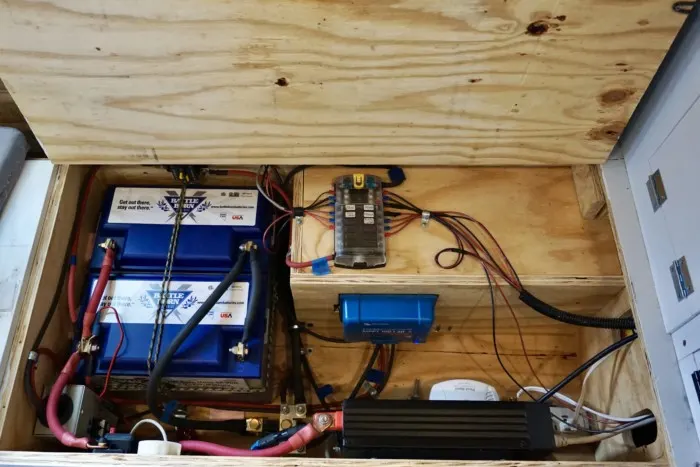
If the campervan has an electrical system, take inventory of all the primary components. Batteries are usually the most expensive part, but things like solar panels, charge controllers, and inverters are costly and important to inventory too.
If you don’t know much about campervan electrical components, you should either educate yourself or find someone knowledgeable to help. You can generally determine a value for the electrical system if you at least know the basics. Or you could enlist the help of a friend or professional who has the knowledge and expertise.
But either way,knowledge is your friend here so you can be sure that you aren’t being over-charged.
Batteries
– Batteries are usually rated in AmpHours (Ah), how much does the campervan have?
– What type of batteries are they (Lithium, Lead-Acid)?
NOTE: Lead-Acid type batteries (SLA, AGM, GEL) can only be discharged about 50% (Depth-of-Discharge), but Lithium batteries can be discharged nearly 100%. So keep in mind that if a used campervan has 400Ah of Lead-Acid batteries that is really only equivalent to about 200Ah of Lithium.
While it’s difficult to say how much battery storage capacity you need (because of so many variables), I will try to offer some general advice. Let’s assume you are trying to just power the basic campervan needs: lights, vent fan, 12v fridge, water pump, charging phones, laptops, and a few other small electronics (cameras, toothbrush, etc.).
100Ah is about the lowest amount a modern campervan will have.
200Ah is sufficient for most people to live comfortably.
400Ah provides ample power for the basics and the ability to handle some heavier draws.
600Ah+ Is usually geared toward people with ambitious power needs (i.e. induction cooktop, electric heaters, etc.)
But this depends on your ability to charge your batteries. The most common method for charging batteries is with solar panels.
Solar Panels
How many Watts of solar panels does the van have? As a general rule-of-thumb, you want to have about twice as many watts of solar as you have usable AmpHours of battery.
Or does the campervan have another method for charging the batteries, like a gas generator, or battery isolator that uses the van’s alternator to charge the batteries?
AC Inverter
Does the van have an AC inverter? (It allows you to charge/power things that require AC power.)
How many watts is the inverter rated for?
Research The Price Of Components
Do some research on how much each of these components costs brand new, and make a final tally. This can give you a ballpark figure of how much money the electrical system is worth. Or you can ask the seller straight-up, but they may not give you the correct value (either intentionally or by accident).
Estimate How Much Life The Batteries Have Left
But you also need to figure out how old the components are. Batteries specifically only have a limited lifespan (measured in charge and discharge cycles).
And since they are so expensive, it’s worth trying to estimate how much life they have left. So you should research the specific type of battery and ask the seller how long they have had them.
For example, let’s say you find a used campervan for sale that has this 125Ah AGM Lead-Acid battery. It sells new for $300 but has been in use for the last 5 years. Hopefully the seller isn’t trying to value that battery as if it is brand new, because it may need to be replaced soon.
Evaluate The Workmanship
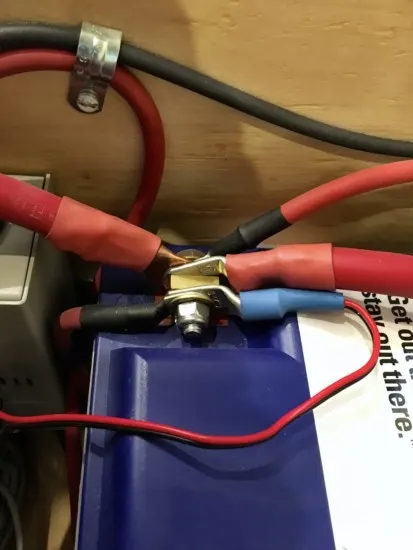
Estimating the value of the components is relatively straightforward. The more difficult part is evaluating the level of workmanship that went into the electrical system. Without a trained eye, it may be difficult to determine if a DIY electrical system was installed properly and safely.
There could be poorly crimped connections, incorrect fuse sizes, incorrect wire sizes, or just subpar materials. Any of these details can result in an unsafe electrical system that could start a fire, or require costly repairs. I don’t want to scare you too much, but the electrical system is the one aspect of a build with the greatest potential to become dangerous.
Luckily, if the seller has been living in their campervan happily for months or years, then you can have some confidence that it hasn’t blown up yet. But that doesn’t mean for sure that it’s safe.
This is where educating yourself or getting a professional electrician to help evaluate the workmanship is important.
Stove
Does the used campervan have a stove or oven? What powers them? (propane, butane, electric).
If the stove uses some combustible fuel like propane or butane you may want to check out how that system is installed. It’s not safe to have a large propane tank stored in the living area without some kind of contained storage that vents to the outside.
If the campervan has an electric stovetop you had better be sure that the van has a large electrical system to support it. It should have at least 400Ah of usable battery storage (and appropriate solar wattage), otherwise, it won’t have enough power for daily cooking needs.
Fridge
Does the used campervan have a fridge? This is another “big ticket” item that can be expensive. Find out what make and model it is and factor that cost into the seller’s asking price.
Or if the campervan has just a cooler, you should be prepared to buy ice every 2-3 days.
Plumbing
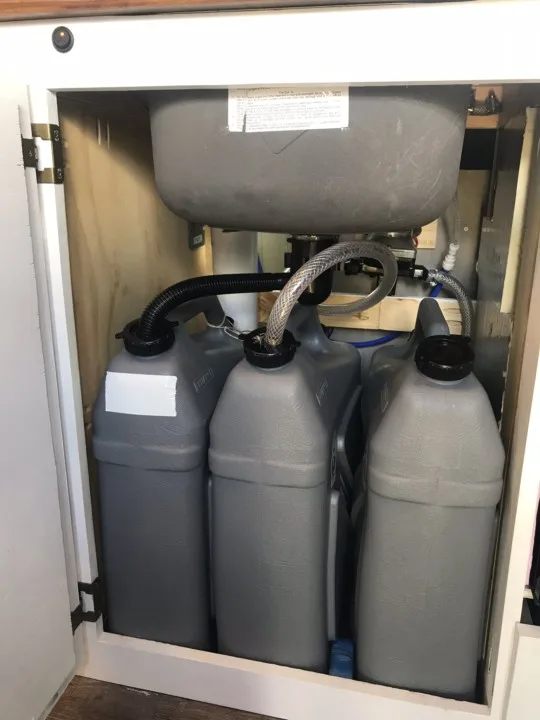
Does the used campervan have running water? Have the seller show you around their plumbing system and explain it.
While the individual parts of a plumbing system are not very expensive. Everything added together can add up to a costly part of the conversion.
Permanent Water Tanks?
Is the water tank permanently installed, or does it have removable jugs? If it’s a permanent installation, then you need to fill up at true RV-style water fill-ups, gas station spigots, etc. Generally, you need to carry a hose with you that you can connect to the water spigot.
Portable Water Jugs?
Or if the used campervan has removable jugs, then you can carry them outside the van to various water fill-ups.
It’s easier to find fill-ups for portable jugs because you can still use RV-style water fill-ups but also can bring your jugs to any water dispensing machines. It’s pretty much like a vending machine for water (common at grocery stores, walmart, etc.). The downside is that you have to carry water jugs around, which are heavy.
What Is The Total Water Capacity?
The more water you can carry, the longer you can go in between fill-ups. If you plan to go off-grid for many days in a row, then a bigger capacity is better. And how much water you need in a campervan depends heavily on your usage. If there is no shower then you can expect to use between 1-2 gallons per person per day for drinking, washing dishes, brushing teeth, and washing your face.
Between 10-30 gallons is an ideal range for most campervans. Less than 10 gallons and you will be constantly going to fill-up. And more than 30 gallons you are adding some serious weight. [30 gallons = 250lbs]
How Is The Water Pumped?
The three most common methods for pumping water are electric pump, foot pump, or gravity-fed.
Gravity-fed water systems just use a jug with a built-in spigot, like you would use for camping. This is the most inexpensive and low-tech solution.
Foot pumps are more expensive and require manual pumping to dispense water. But people appreciate that they are quiet, conserve water, and don’t require electricity.
Electric pumps are the most expensive but provide the most convenient and familiar style of operation. They do require electricity but usually run pretty efficiently on 12v.
Does the Used Campervan Have a Shower
Showering will use more water than any other activity, so that is a big factor. Keep in mind that you still won’t be having a luxurious 30-minute shower. Even a short shower uses a lot of water.
Built-in shower installations are rather pricey, so the seller is probably factoring in at least a couple hundred dollars for that luxury.
What About A Toilet?
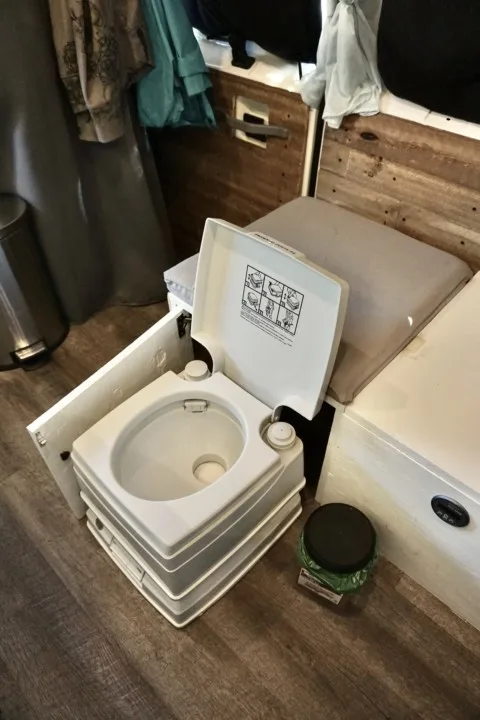
The most popular types of campervan toilets are composting or cassette toilets. Top-of-the-line composting toilets cost about $1000. But cassette toilets are usually around $100.
Mold & Water Damage
Mold and water damage are two common problems with older campervans. Finding it is tricky though, since it’s often hiding out of view. Unfortunately, you can’t really peel back the walls or look under the floor for water damage or mold. But there are a few things to take note of.
Does the used campervan have a vent fan in the ceiling? Any respectable campervan should have a vent fan because ventilation is so important for controlling moisture. (Read all my best tips about proper airflow in campervans).
Insulation
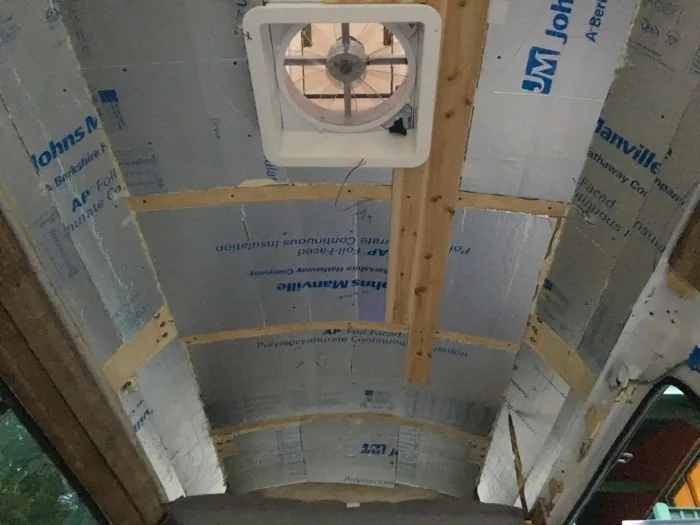
Ask the seller about the insulation in the campervan. What kind of materials are used? Spray Foam, Foam Board, Sheep’s Wool, and Thinsulate are some of the best materials in terms of warmth per inch (R-value).
But this is another tricky thing to verify because the insulation is likely hidden behind the walls, floor, and ceiling.
The only types of insulation that would raise a potential red flag for me are fiberglass, rock wool, and denim batts. If the used campervan has any of these, I would stay away because they are all pretty bad at dealing with moisture and the van could have some ugly moisture problems going on behind the scenes.
You can ask the seller where and when they travel in their campervan. This should give you some idea of the climates that they traveled (somewhat) comfortably in.
If you plan on using this used campervan for hanging around ski towns, then you had better be sure that it’s equipped for cold weather. On the other hand, a winter-oriented conversion might not be a good fit for the hot, humid weather in Florida.
Heat Or AC
Does the used campervan have a heater or AC?
If it has a fancy version of either, those could also be expensive items that the seller has factored into their asking price.
Get an idea of how they power these devices because both heaters and AC units require a lot of electricity or combustible fuels. This should be factored into the operation cost of living in the campervan.
Layout
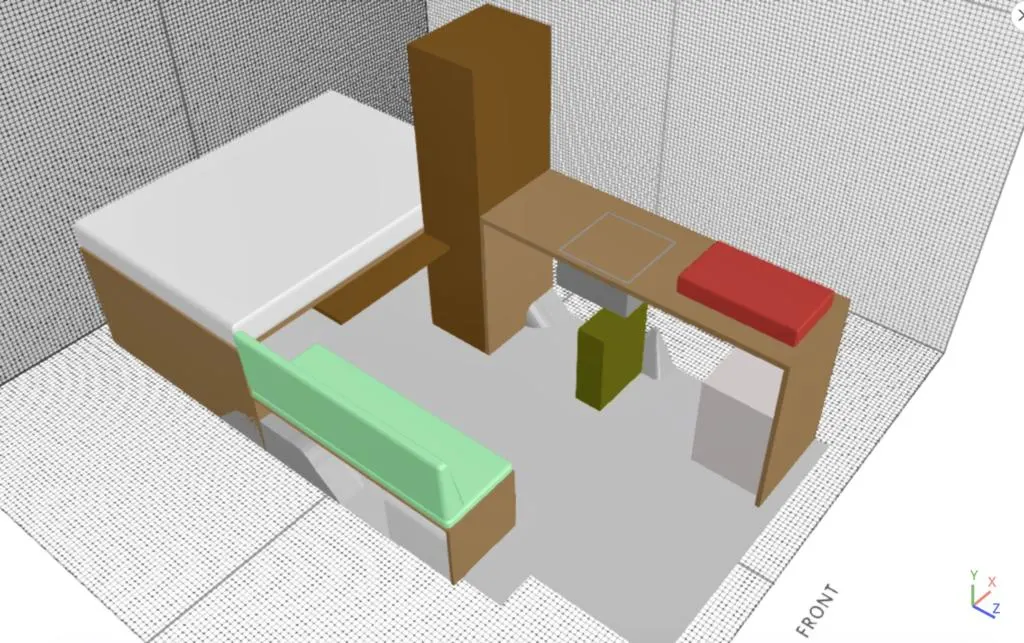
And almost as important as anything else, do you like the interior layout? Can you see yourself living comfortably in this used campervan?
If you like to cook, does the kitchen seem well-equipped for cooking often?
Does the layout have sufficient room to store your personal items (skis, bikes, etc.).
{Or you can always add some additional external storage options}
Can you stand up?
If you are looking for a standing-height van, does it provide enough clearance for you?
Size of Bed?
How is the bed oriented? If the bed is mounted width-wise, then it may not be wide enough for tall people.
Make sure that you will fit in the bed. And if you are seeing the used campervan without a mattress, then just be aware that the thickness of a mattress will raise the height of the bed even more. And nearly all vans get narrower the higher up you go.
You can read all about which vans are best for sleeping sideways in.
Is the conversion for two people or one?
Some campervans are designed with a specific person or couple in mind. If you plan on living solo, then you may not want a van designed for two people, or vice versa.
Or if you plan on having your pets in the van, try to envision how the layout would work for them. Is there a good place for their crate, food, toys, etc?
Labor Costs
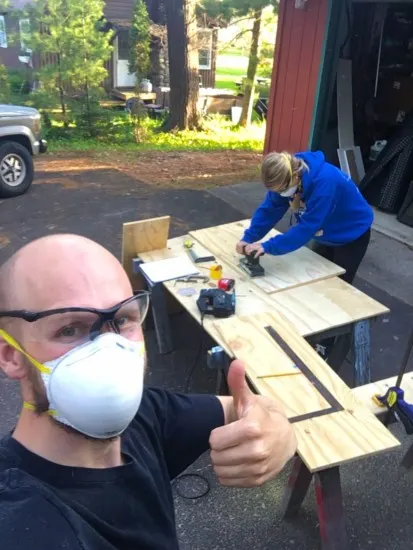
The last major cost that the seller might be trying to unload onto you is the price of labor. If their van was professionally converted then they probably paid a pretty penny in labor costs. And they are certainly going to try to recoup some of that money when they sell it.
If the van is self-converted, then the seller is less likely to factor in their own theoretical labor costs. But they might.
If there is a big discrepancy between your valuation of the van and the conversion materials, labor costs could be the culprit.
Where To Find A Used Campervan For Sale
- Conversion Trader
- RVTrader
- eBay
- Craigslist
- Facebook Marketplace
Conclusion For How To Buy A Used Campervan For Sale By Owner
As you can see, there is a huge variety of factors to consider when buying a used campervan. Because it’s basically like buying a vehicle and a home all in one transaction. So there’s a lot to consider.
I wanted to cover as many of the nitty-gritty details as possible. But don’t get too hung up on the more minor details.
The most important thing is finding a used campervan that is in good mechanical condition and fits your basic criteria.
Nearly everything else is fixable either through repairs or renovations.
And even a “less than perfect” campervan can provide you with the amazing freedom and enjoyment that Vanlife is so famous for.
Good luck!
Save ‘How To Buy A Used Campervan For Sale’ For Later
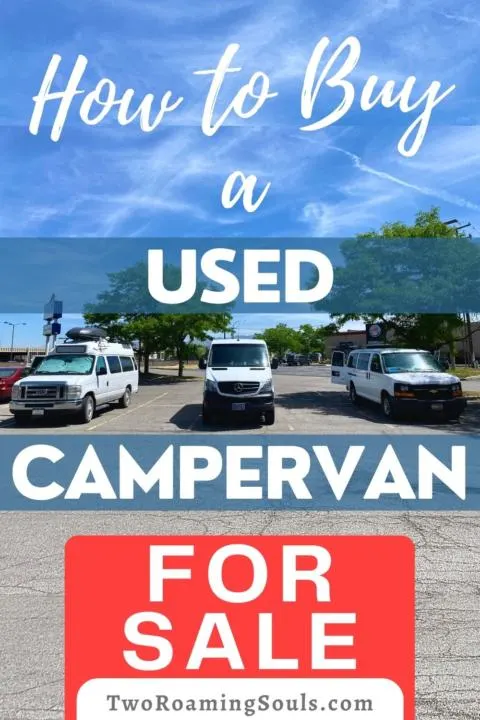
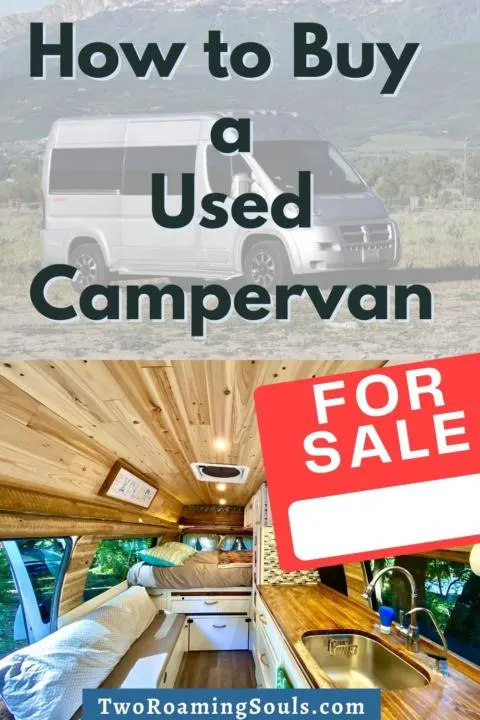

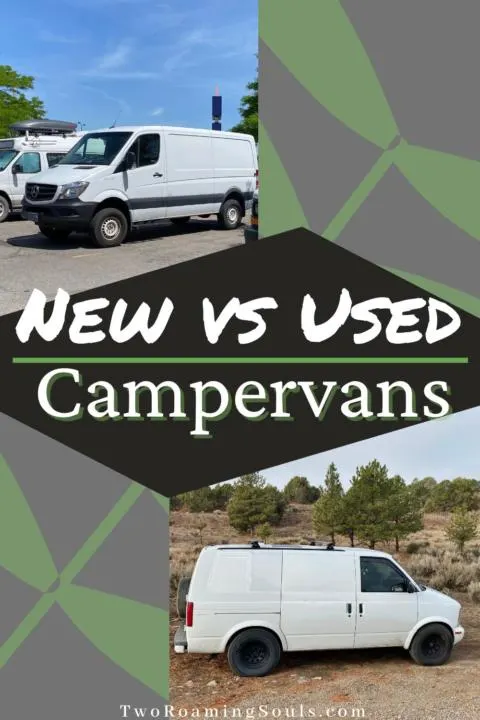
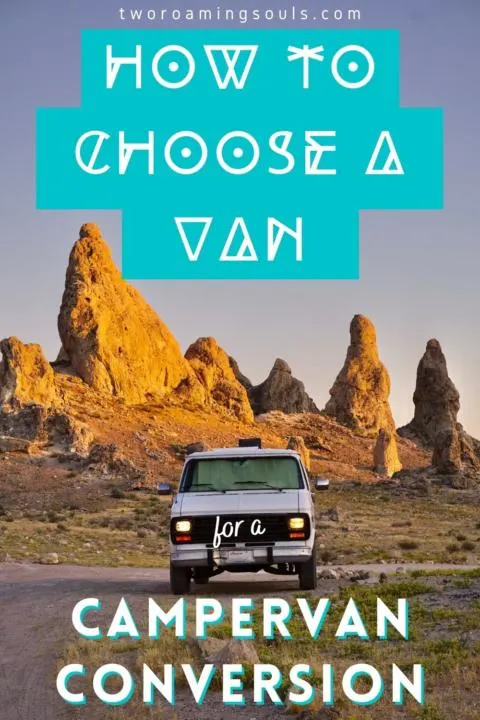
Where To Buy A Used Campervan | Great Online Resources - tworoamingsouls
Monday 22nd of February 2021
[…] How To Buy A Campervan For Sale By Owner […]